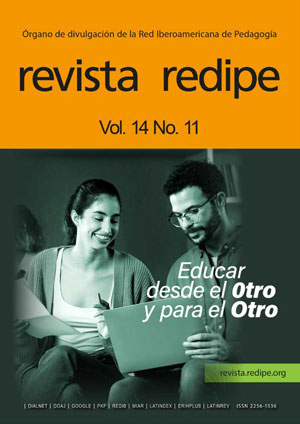Assessment of a teacher training program in environmental education on knowledge, attitudes and practices
Main Article Content
Keywords
Teacher training, Environmental education, Action research, Perceptions
Abstract
This study evaluated the change in teachers’ Knowledge, Attitudes, and Practices resulting from a teacher training program in Environmental Education implemented with 18 teachers from educational institutions in Florencia, Caquetá. A mixed-methods study was conducted using a quasi-experimental pretest–posttest design, complemented by qualitative analysis. Quantitative results showed significant improvements in Knowledge and Practices, with large effect sizes, while Attitudes exhibited positive but non-significant changes. Qualitatively, participants highlighted the contextual relevance of the program and the applicability of active methodologies. A positive correlation was identified between the increase in knowledge and the implementation of environmental pedagogical practices. The study concludes that contextualized teacher training based on participatory methodologies fosters the appropriation of knowledge and its transfer to the classroom, although strengthening attitudes requires longer-term processes.
References
Amézquita-Galindo, S. L., & Salgado, N. L. (2025). Assessment of teachers’ knowledge, attitudes, and practices in environmental education in a mediumsized Colombian city. Eurasia Journal of Mathematics, Science and Technology Education, 21(9), em2690. https://doi. org/10.29333/ejmste/16768
Amézquita-Galindo, S. L., & Losada-Salgado, N. (2025). Formación docente en Educación Ambiental: El aula, un territorio ambiental [Informe]. Zenodo. https://doi. org/10.5281/zenodo.17064119
Andrade, C. (2021). The Inconvenient Truth About Convenience and Purposive Samples. Indian Journal of Psychological Medicine, 43(1), 86–88. https://doi. org/10.1177/0253717620977000
ATLAS.ti Scientific Software Development GmbH. (2023). ATLAS.ti (Versión 25) [Computer software]. https://atlasti.com
Bamrara, A., & Bamrara, P. (2024). Environment Education Through Experiential Learning: A Case of Pauri Garhwal, Uttarakhand. In Teaching and Learning for a Sustainable Future: Innovative Strategies and Best Practices (pp. 129- 141). IGI Global Scientific Publishing. https://doi.org/10.4018/978-1-6684- 9859-0.ch007
Boeve-de Pauw, J., & Van Petegem, P. (2018). Eco-school evaluation beyond labels: The impact of environmental policy, didactics and nature at school on student outcomes. Environmental Education Research, 24(9), 1250-1267. https://doi. org/10.1080/13504622.2017.1307327
Boeve-de Pauw, J., Gericke, N., Olsson, D., & Berglund, T. (2015). The effectiveness of education for sustainable development. Sustainability, 7(11), 15693-15717. https://doi.org/10.3390/ su71115693
Bowling, A. M., Klooster, W., & Lindsey, A. J. (2024). Professional development sessions increased teacher knowledge and confidence to include agriculture in core curricular courses. Natural Sciences Education, 53(2), e20152. https://doi.org/10.1002/nse2.20152
Braun, V., & Clarke, V. (2006). Using thematic analysis in psychology. Qualitative research in psychology, 3(2), 77- 101. https://doi.org/https://doi. org/10.1191/1478088706qp063oa
Diez-Ojeda, M., Queiruga-Dios, M., & QueirugaDios, M. Á. (2025). Service-learning in environmental education of primary preservice teachers: Advancing SDGs and improving attitudes towards sustainable development. Education Sciences, 15(1), 98. https://doi. org/10.3390/educsci15010098
Dumrauf, A., & Cordero, S. (2020). Un enfoque participativo para la formación docente continua en la Educación en Ciencias Naturales, Ambiental y en Salud. Revista Eureka sobre Enseñanza y Divulgación de las Ciencias, 17(1), 160201-160215. https://doi.org/10.25267/Rev_Eureka_ ensen_divulg_cienc.2020.v17.i1.1602
Eliyawati, E., Widodo, A., Kaniawati, I., & Fujii, H. (2023). The Effectiveness of Teacher Training on Environmental Education: Challenges and Strategy for Future Training Program. Jurnal Penelitian Pendidikan IPA, 9(8), 6056-6066. https:// doi.org/10.29303/jppipa.v9i8.3153
Gómez, G. L. G. (2012). La enseñanza de las ciencias naturales y la educación ambiental en la escuela: realidades y desafíos. Praxis & Saber, 3(5), 9-14.
Hurtado Soler, A., Botella Nicolás, A. M., Fernández Maximiano, R., & Martínez Gallego, S. (2023). Development of Social and Environmental Competences of Teachers in Training Using Sound and Visual Landscape. Education Sciences, 13(6), 593. https://doi. org/10.3390/educsci13060593
Hyseni Spahiu, M., & Lindemann-Matthies, P. (2015). Effect of a toolkit and a oneday teacher education workshop on ESD teaching content and methods—A study from Kosovo. Sustainability, 7(7), 8051-8066. https://doi.org/10.3390/ su7078051
Kara, S., & Aslan, O. (2025). Innovative Evaluation of Pre-Service Science Teachers’ Nature of Science-Based Activity Practices and Their Integration with Science Subjects. Science & Education, 1-44. https://doi.org/10.1007/ s11191-025-00665-w
Kocak, E., Çelik, A. Y., & Uluyol, C. (2023). Pre-service Teachers’ Environmental Literacy: The Role of STEMbased environmental education with microcontrollers. Participatory Educational Research, 10(5), 233- 247. http://dx.doi.org/10.17275/ per.23.84.10.5
Kollmuss, A., & Agyeman, J. (2002). Mind the Gap: Why do people act environmentally and what are the barriers to pro-environmental behavior? Environmental Education Research, 8(3), 239–260. https://doi. org/10.1080/13504620220145401
Lopera Pérez, M., Rieckmann, M., & Marín Mejía, M. (2023). Educación ambiental y los Objetivos del Desarrollo Sostenible. Experiencia de formación de docentes en contextos rurales. Bio-grafía. Recuperado a partir de https://revistas. upn.edu.co/index.php/bio-grafia/article/ view/18258



